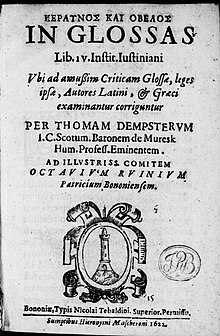Thomas Dempster
Thomas Dempster (born August 23, 1579 in Cliftbog , Aberdeenshire , † September 6, 1625 in Bologna ) was a Scottish classical philologist , historian and poet, who particularly promoted the developing Etruscology through his work.
Thomas Dempster came from a Catholic Scottish noble family. His curriculum vitae was determined by family disputes and denominational disputes in Europe. From 1589 to 1598 he studied classical philology and philosophy at the universities of Cambridge , Paris , Leuven , Rome and Douai . He saw Justus Lipsius as his most important teacher . After completing his studies, he held professorships in classical philology, philosophy and Roman law at various universities : Tournai , Paris , Toulouse , Montpellier , Nîmes and, from 1609, for the second time in Paris. In 1615 he returned to the British Isles and became historicus regius , court historian of James I. It would be the only time that he held a position outside the Catholic sphere of influence. Due to courtly hostility, he was only able to hold this position for about a year and initially went to Rome, but was still professor of Roman law at the University of Pisa in 1616 , and for ancient literature at the University of Bologna from 1619 until his death . Only in the last decade of his life was Dempster able to bring calm to his wandering life. During the Pisan period he wrote a history of the Etruscans on behalf of Cosimo II , his main work.
Dempster researched the cultural heritage and the history of antiquity primarily on the basis of the written legacies, archaeological, numismatic or epigraphic evidence he almost never included. He edited the work of Gorippus and commented on the work of Claudian and the Institutiones Iustiniani . In his main work, De Etruria Regali , he stated a continuity between the Etruscans and the Medici in Tuscany in the spirit of his Medici client . Nevertheless, he tried to provide a correct historical representation and named incorrect research approaches, such as the construct of a relationship between the Aramaic and the Etruscan language . However, Dempster himself had no access to Etruscan, as he himself admitted. In particular Annius von Viterbo was harshly criticized by Dempster for the theses he had put into circulation. As usual, he ignored material culture and relied on ancient Greek, Latin and Byzantine sources, but also on modern genealogies of the 16th century, which he considered ancient. For the Italian regional studies he used the work of Flavio Biondo and Leandro Alberti . Dempster was alien to source criticism in his work. The work was extremely influential, although it was not printed until a long time after his death in Utrecht in 1701 . The illustrations for the work as well as additional explanations came from Filippo Buonarroti . Through Buonarroti's adaptations, Dempster's work became one of the decisive impulses for a new enthusiasm for the Etruscans in Italy, the so-called "Etruscheria".
In addition, Dempster was also a poet in the Neo-Latin language , wrote panegyrics and speeches. Not all of these works have survived, but there is still a considerable amount. He also edited early modern authors, such as the natural history work of Ulisse Aldrovandi and the antiquarian, greatly expanded, corpus work of Johannes Rosinus (1551–1626). In the field of history he worked on the history of Scotland and church history . In his work he was not very careful and very local patriotic. So he made Schotten out of Boniface and Brigida von Kildare , which earned him considerable criticism.
Works
- Antiquitatum Romanarum corpus absolutissimum by Johann Roszfeld , Paris, 1613.
- Panegyricus Jacobo M. (Magnae) Britanniae Regi , London, 1616.
- In Obitum Aldinae Catellae: lachrymae poeticae , Paris, 1622.
- Keraunos kai obelos in glossas librorum quatuor Institutionum ( la ). Nicolò Tebaldini, Bologna 1622.
- De bello a Christianis contra barbaros by Benedetto Accolti , 1623.
- Historia ecclesiastica gentis Scotarum , Bologna, 1627
literature
- Alexander Du Toit: Dempster, Thomas. In: Oxford Dictionary of National Biography . Volume 15, Oxford University Press, Oxford 2004, pp. 759-762.
- Dirk Steueragel : Dempster, Thomas. In: Peter Kuhlmann , Helmuth Schneider (Hrsg.): History of the ancient sciences. Biographical Lexicon (= The New Pauly . Supplements. Volume 6). Metzler, Stuttgart / Weimar 2012, ISBN 978-3-476-02033-8 , Sp. 1089-1091.
| personal data | |
|---|---|
| SURNAME | Dempster, Thomas |
| ALTERNATIVE NAMES | Dempsterus, Thoma; Dempsterus, Thomas; Muresk, Thomas D .; Demsterus, Thomas; Dempstero, Thoma; Dempstero a` Muresk, Thoma |
| BRIEF DESCRIPTION | Scottish classical philologist, historian and poet |
| DATE OF BIRTH | August 23, 1579 |
| PLACE OF BIRTH | Cliftbog |
| DATE OF DEATH | September 6, 1625 |
| Place of death | Bologna |

